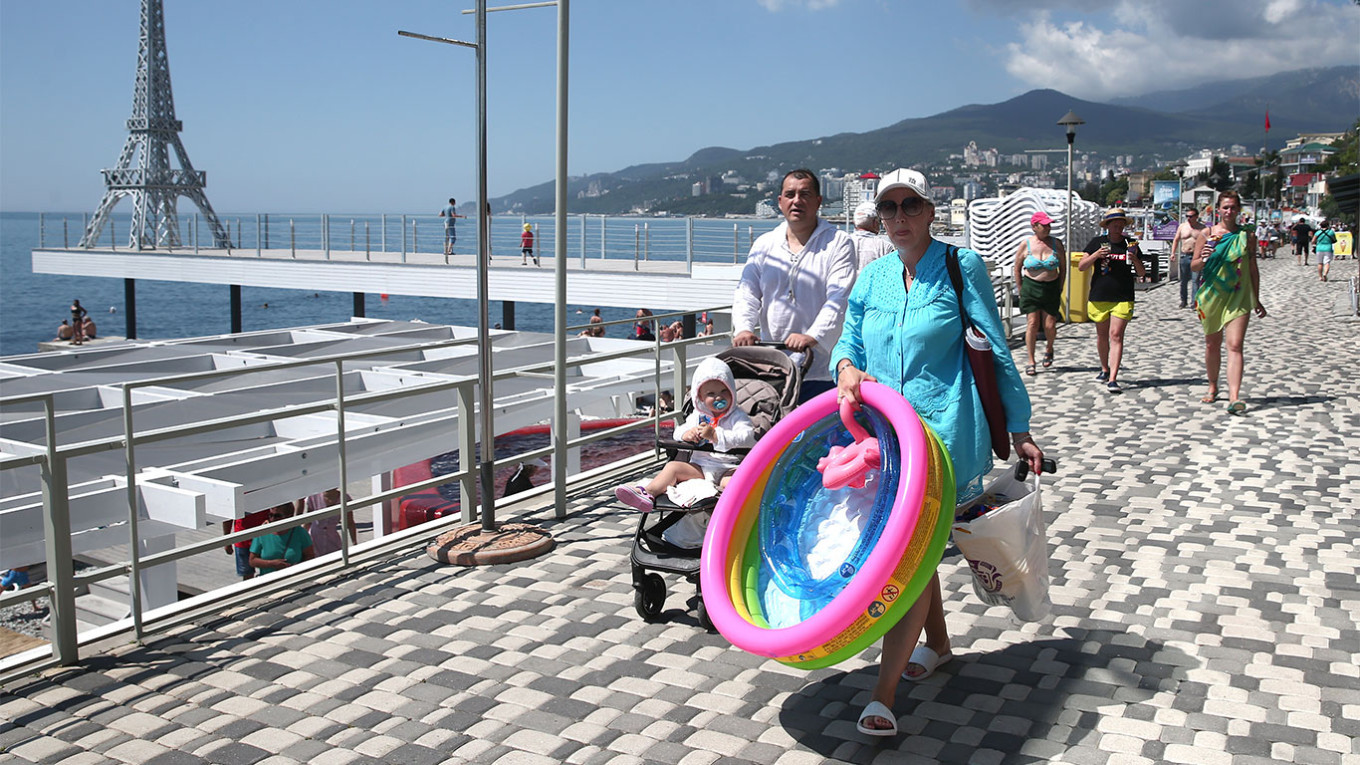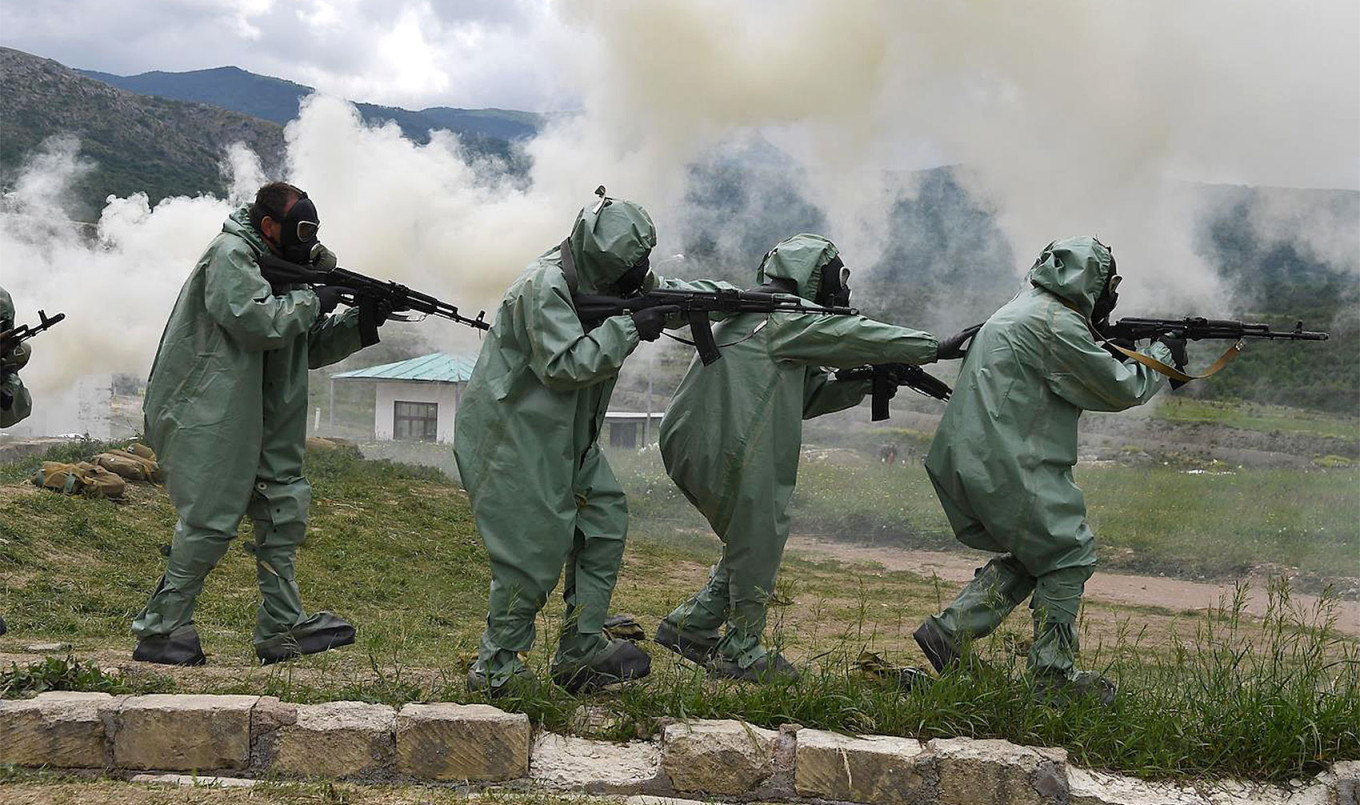Crimea’s tourism industry is braced for another lost summer as Kyiv’s accelerating counteroffensive raises fresh safety concerns on the annexed peninsula and millions of Russian vacationers are set to stay away from its Black Sea resorts for the second year running.
Tourist flows to Crimea — already down by around a third in 2022 — have fallen even further this year, industry figures say, with some fearing Russia’s ongoing invasion of Ukraine is delivering a potentially fatal blow to businesses in the sector, a central part of the region’s economy.
“It’s having an extremely negative impact on the local economy. Many restaurants have closed, half of the seasonal guest houses do not open and might never be able to open again,” the owner of a hotel near the beach in Sevastopol told The Moscow Times. They asked for anonymity, saying they planned to apply for government-backed financial support and were worried how the authorities might react to any negative public comments.
Before the war, that hotel’s rooms would have been sold out months in advance. But the owner said this year, it will be at just 30% capacity in June and around 60% in the peak make-or-break months of July and August.
“We’re basically on for break-even this year — just earning enough to pay salaries. We’ve dropped our prices, but our costs are up by 30-50%. We can’t buy new linen or dishes and are having to live off our reserves,” the owner added.

President Vladimir Putin dubbed Crimea Russia’s “crown jewel” after he annexed it in 2014, promising locals prosperity, security and investment from Moscow.
Many of those promises were already ringing hollow even before Russia invaded Ukraine, with Crimea struggling under heavy sanctions and economic crises for much of the post-annexation period.
Fortunes appeared to be on the up in 2021 as pandemic-related border closures gave a much-needed boost to the domestic tourism sector, with a record 9.4 million Russians opting to summer in Crimea, according to government data.
Now the fallout of Russia’s invasion — which has resulted in multiple attacks on the region — is threatening to destroy that short-lived peak, and could push Crimea’s vital tourism and services economy into a deep financial hole.
Official government data showed 60% of firms in the tourism industry were in the red last year, with combined losses of 709 million rubles ($10 million), as tourist inflows dropped by around a third. In 2021, profits had come in at 1.8 billion rubles ($25 million).
Only 3% of Russian hotel bookings were made in Crimea last year, down from 19% in 2021, according to online booking portal Ostrovok.Ru. This year they have fallen even further, to just 1%.
Russian-installed officials and some industry figures insist Crimea is safe for tourists, despite being well within reach of Ukrainian weapons and having been rocked by attacks during the course of the 16-month war.
“Because of the information agenda right now, many are simply afraid … But I want to assure you that nothing threatens tourists in Crimea,” the state-run RIA Novosti news agency cited Crimea’s Russian Governor Sergei Aksyonov as saying.
Last August, sunbathers on a Crimean beach were forced to run for cover when a series of powerful explosions rocked the nearby Saki airbase — a brazen attack on just one of the peninsula’s many military sites.
There have also been naval drone attacks against the headquarters of Russia’s Black Sea fleet stationed in Sevastopol and a car bomb that disrupted travel across the Crimean Bridge for months.
But pointing to recent drone attacks in Moscow and instability in the Belgorod border region, Sergei Makovey, the head of the Crimean Hotels’ Association, told The Moscow Times the situation in Crimea looked good, especially along the southern shores.
“In comparison with some other border regions … We are much calmer here. Nothing is happening, the sun is shining, the sea is getting warmer, restaurants are open and businesses are waiting for guests,” he said.
“Hardly anything can scare us … we are very used to having to adapt to different circumstances. We aren’t getting discouraged — absolutely not.”

Officials say the more reduced flow of tourists is largely the result of Russia banning flights from the rest of the country to Simferopol airport and that there is still high demand to visit Crimea’s Black Sea resorts once loved by Russia’s tsars.
Train connections — heavily disrupted by the October 2019 bombing of the Kerch Bridge — have been unable to replace the 30% of arrivals that used to arrive by air.
Some are sanguine about the role the looming war that Moscow calls a “special military operation” is having on would-be tourists.
“Of course tourists have concerns about safety,” tour guide Roman Lysenko said. “The situation is unlikely to change significantly this summer.”
Amid the downturn, he said some tour guides had left Crimea and headed to Sochi or other resort towns on the Russian mainland in search of business.
Others remained outwardly bullish despite the threat of attack, waning tourist numbers and businesses chalking up losses.
“Many are scared by the ‘counteroffensive,’ but the first vacationers have already arrived, seen everything and will report back that it is calm in Crimea,” said the owner of the 117 Beach Club in the southern resort town of Feodosia, who declined to give their name.
“Let those who are pissing their pants continue to be afraid — but everything is calm here,” they added.